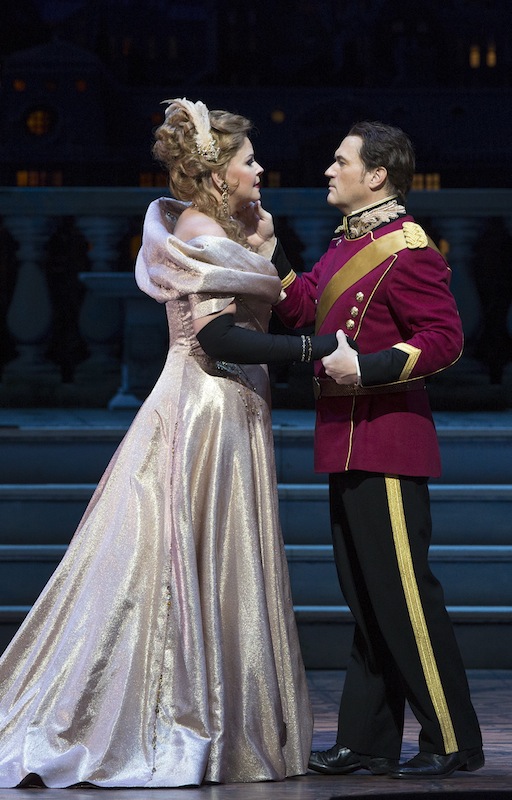Met’s seasonal “Merry Widow” hits its stride in crowd-pleasing revival

Susan Graham and Paul Groves in Franz Lehár’s “The Merry Widow” at the Metropolitan Opera. Photo: Marty Sohl
The Metropolitan Opera’s holiday season revivals of Franz Lehár’s The Merry Widow are a new tradition being formed in front of a live audience, as it were.
The operetta premiered at the Met in 2000, then was redone in its current English-language production from Susan Stroman, which was unveiled New Year’s Eve 2014 starring Renée Fleming. Up to Thursday night’s revival opening, that made for 40 performances, many featuring mezzo-soprano Susan Graham as the widow herself, Hanna Glawari. She first appeared in the 2003 revival, and since Thursday has now performed the title role three straight years, including last year’s Christmastime run.
Graham was fine last year, and Thursday was even better. Her mastery of the role has gained from experience, going beyond technical to casual; with every line reading more relaxed, the music seemed both easy and satisfying to her. Her big number, Act II’s “Vilja,” was a true show-stopper.
She also gave off the effect that she relished every one of William Ivey Long’s dazzling gowns. The costuming—formal wear, uniforms, faux-national dress—and the stage dressing are as important to this production as the casting and performances. This is a production that looks like a Christmas window at Bergdorf’s, and should probably only run during this season, when idle thoughts are in the mind and escape is in the air.
Of course, without good music-making, one would soon tire of applauding the scenery. Hannah’s romantic protagonist, Count Danilo Danilovitch, was sung by tenor Paul Groves. Filling out this cast of dozens were soprano Andriana Chuchman as Valencienne, baritone Sir Thomas Allen as her dimwitted husband Baron Mirko Zeta (though there’s barely any singing in the role), tenor David Portillo as her lover Camille de Rosillon.
Chuchman is as ideal for Valencienne as Graham is for Hanna. Not only her voice, but her entire personality sparkles as Valencienne. She was a charming second romantic lead through the first two acts, and a more-than-decent dancer in the company of the Grisettes in Act III. The scene at Maxim’s showed a fine talent for physical comedy that few opera roles allow.
Portillo was properly earnest, square, and over-heated as Rosillon. Yet their scenes together were a little unbalanced, since he lacks Chuchman’s vocal brilliance.
Groves was Graham’s equal, and nearly as much of a scene stealer. At his first appearance in Act I his acting was a little stiff, and his voice sounded a little dry. He was quickly in gear, though—the dryness turned into warmth (although there were periods throughout where both he and Graham had trouble projecting), and his acting turned superb. He managed to be funny without being goofy, energetic without being frantic, and had a palpable straightforward dignity that made him extremely quick and light-footed.
The cast fit well into the other important strength of this production—Stroman’s direction. She comes from Broadway and treats The Merry Widow like a musical. While the approach is somewhat anachronistic in Lehár, it’s a perfect fit on its own terms.
Yet, other than the style of singing, it’s hard to see what generally separates operetta from musicals, and this is a musical in every way, with the story told through dialogue and then made more vivid, enjoyable, and lovely through music. And the music in this score amounts to a set of numbers; the love duet, the comic ensemble, the patriotic bit.
Our cultural history since 1905 makes all this more deeply rooted and logical. Most people discover Freedonia before they ever hear of Pontevedro, and most have seen a romantic comedy at the movies before they see The Merry Widow (which is a good romantic comedy, like they used to make). Graham and Groves at times, uncannily, recalled Nelson Eddy and Jeanette MacDonald.
This is not a slapstick production, but the breezy, confident self-consciousness (exemplified by the excellent comic actor Carson Elrod, who was just campy enough in the non-singing role of Njegus), is built on knowledge of the Marx Brothers movies and other classic comedies.
The direction almost pulls Act II all the way out of its doldrums. The score is relatively weak here, with lots of activity leading to only slight developments in the plot. Things are in no way dull but the overall feeling tends to be static and repetitive. The production doesn’t solve that problem, but it does put excellent frames around the two great set pieces; the imaginary nationalist dance at the beginning and the sex-farce men’s ensemble, when they wonder just “what the hell” women are thinking. It was one of the funniest moments in the operetta.
An ancillary tradition that is growing with this piece is that it has been the vehicle for conductors’ debuts, with Asher Fisch and Kirili Petrenko both appearing in the pit for the first time. This continued Thursday, with Ward Stare, music director of the Rochester Philharmonic Orchestra, making his debut. He had an excellent light touch and keep the pace going, the only problems being an occasional negotiation of tempo with the singers in real time. Stare did his best to follow their lead and often succeeded.
In the end, technical and musical criticism matters little in this production, which is meant to please the crowd–which it did Thursday night in every way.
The Merry Widow continues at the Metropolitan Opera through January 11. metopera.org; 212-362-2000.



Posted Dec 19, 2017 at 9:03 am by Adam D.
Dear Mr. Simpson – Re: Figaro review. Couldn’t agree more – We attended Friday evening. I would add that while some of the arias were beautiful, overall, the drama of the production was removed completely by ineffective timing interactions between the characters and the tempo of the orchestra diminished the emotional impact of those arias. Overall, sluggish and not comical.